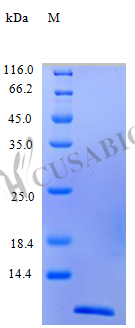Our Recombinant Human CCL24 protein is a high-quality product designed for use in various immunology research applications. This protein, also known as C-C motif chemokine 24, is expressed in E.coli and encompasses amino acids 27-104. The tag-free, lyophilized powder ensures ease of use and can be reconstituted with sterile water or buffer.
Our product meets stringent quality control standards, with a purity of >97% as determined by SDS-PAGE and HPLC analysis. Endotoxin levels are consistently kept below 1.0 EU/µg, as determined by the LAL method. The Recombinant Human CCL24 protein retains full biological activity, as demonstrated by a chemotaxis bioassay using human peripheral blood eosinophils, with activity in a concentration range of 50-100 ng/ml.
The study of CCL24 has revealed its essential role in various aspects of immunoregulation. In a landmark study, Kitaura et al. (1999)[1] demonstrated that CCL24 functions as a selective chemoattractant for eosinophils, playing a crucial role in the pathogenesis of allergic disorders. Furthermore, as Yuan et al. (2016)[2] explored, CCL24 is implicated in the development of atopic dermatitis, underscoring its potential as a therapeutic target. The collective findings of these studies not only emphasize the importance of CCL24 in the immune system but also highlight the opportunities for targeted interventions in immune-related diseases.
References:
1. Kitaura M, et al. Molecular cloning of human eotaxin, an eosinophil-selective CC chemokine, and identification of a specific eosinophil eotaxin receptor, CC chemokine receptor 3. J Biol Chem. 1999;274(39): 27975-80.
2. Yuan Y, et al. Serum eotaxin-1 is a potential biomarker for atopic dermatitis in an Asian population. Int J Dermatol. 2016;55(2): e86-92.






